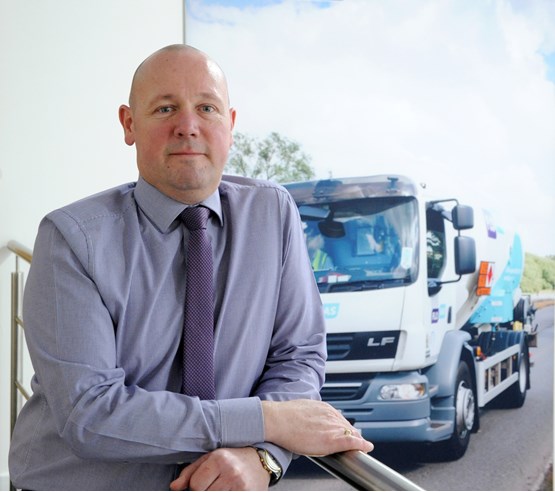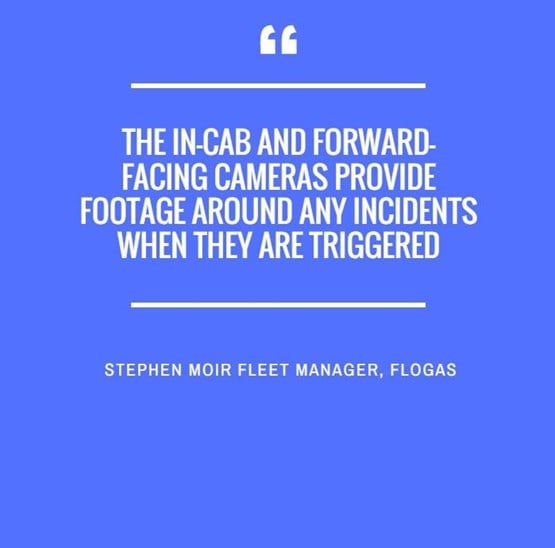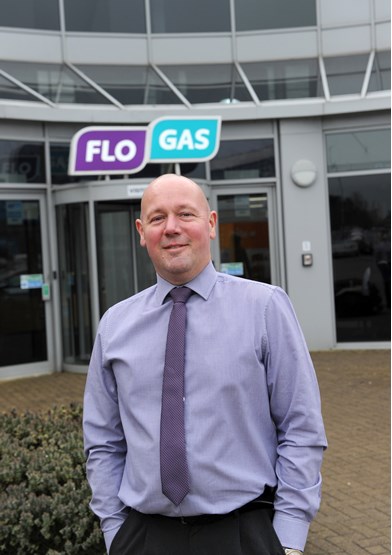Fleet manager Stephen Moir is driving a range of innovations to ensure that the Flogas Britain fleet remains cost-effective and fit for purpose. By John Maslen
Commercial vehicle fleets often act as the life support system of the UK, delivering essential equipment and goods that power the economy on a daily basis. This critical role means that reliability is important, as the consequences of failed deliveries can be widespread and costly.
Safety is a critical part of maintaining service levels to avoid incidents that could cause delays, disruption or injury.
The safety message sits at the heart of the fleet at Flogas Britain, a leading liquefied petroleum gas (LPG) supplier whose fuel is used to power everything from camping equipment and home heating systems to major industrial machinery.
It operates a fleet of a little less than 400 commercial vehicles, including lorries, rigid bulk carriers and flatbeds, offering deliveries of bulk gas and cylinders from more than 50 UK depots.

Constant investigation
With businesses and consumers depending on deliveries, fleet manager Stephen Moir is constantly investigating new ways to maintain high safety standards.
He says: “We don’t compromise at all when it comes to safety. We are very focused in this area and that includes on-site safety.
“It is a sector of the transport industry that is high-profile and we are very mindful of the product we are carrying.”
Professionalism is at the heart of the fleet’s approach, with drivers already qualified by law to a high standard under ADR rules, the European agreement concerning the International Carriage of Dangerous Goods by Road.
As drivers are all licensed to this standard, they have a focus on safety that pays dividends when it comes to minimising incidents.

Moir adds: “Drivers have to shadow another employee for at least two weeks before going out on their own, then they are put through further assessments.
“We also do a lot of training in-house to make sure there is a very high standard from a business perspective that they have to work to, with ongoing training and familiarisation.”
You might expect a supplier of LPG to be in the vanguard of LPG vehicles, using its fleet as the ultimate billboard.
Unfortunately for Flogas, while it operates one gas-powered Mercedes-Benz Actros, health and safety legislation precludes spark ignition vehicles around gas storage depots, forcing the fleet to use diesel.
“It is not through any lack of desire, but gas storage legislation is a factor in using gas for vehicles. Until the rules change, it will limit their use on the fleet,” says Moir.
Using cameras to reduce incidents
To reinforce its safety message, Flogas has invested in a forward- and cab-facing camera system from Lytx that has played a key role in reducing preventable incidents and supporting targeted training programmes.
When an incident occurs, the system provides vital recording of events before and afterwards.
“The in-cab and forward-facing cameras provide footage around any incidents when they are triggered,” he says.
“The benefits are twofold. First, it is a very effective driver behaviour tool and encourages consistent driving performance; second, it is very good for insurance claims that we might otherwise not have been able to defend.
“We may not have had proof without this footage. Our drivers are cautious because of their load, but some road users are not aware of the limitations of a truck, such as stopping distances, visibility and the need for space when turning.”
READ MORE: Flogas Britain makes FTA Logistics Awards shortlist
When the system was introduced, it led to a reduction in preventable driver events, but in his ongoing search for new safety ideas, Moir has introduced an innovation that extends the benefits of the camera system even further.
Preventing roll-away trucks
Flogas Britain has become the first gas supplier to install BrakeSafe from Vision Techniques on its vehicles to prevent any risk of a vehicle roll-away on its tanker fleet.
Moir originally considered visual and audible alerts, but they still required input from the driver, so weren’t considered to offer a high enough level of protection.
The BrakeSafe failsafe system automatically applies the handbrake if a driver forgets when leaving the vehicle, helping prevent a vehicle runaway.
Moir worked closely with the Vision Techniques team to adapt the system so that if BrakeSafe is triggered, the incident is also recorded on the vehicle’s camera system.
“To be able to capture footage of what was occurring at the time of a roll-away is vital,” he says.

“It will give us unambiguous and impartial evidence of what was going on in the seconds leading up to an incident, which is invaluable in helping us to ensure that similar events do not happen again.
“I never want to take the call telling me that one of our vehicles has rolled away and been responsible for serious injuries or deaths. No fleet manager would ever want to deal with that.”
Moir has personal experience of the impact of a roll-away when working with a previous company.
“I have worked in other businesses and seen the aftermath of a roll-away. No one was hurt but it caused an awful lot of damage and the paperwork and management time that was required afterwards was a real problem.
"Up until recently, there was nothing that could prevent it,” he says.
“I watched a demonstration of the system from Vision Techniques and was really impressed. To have this on vehicles carrying LPG and LNG (liquefied natural gas) gives us peace of mind.”
An essential element of being able to introduce innovations has been the strength of partnerships with suppliers and a strong working relationship with senior executives within Flogas Britain.
Moir received backing from the board after presenting a strong business case which included evidence of the potential benefits.
“The project went to director level for approval and the board understood that it offered a level of protection we didn’t have,” he says.
“For a vehicle lifecycle of around 10 years, it is a good investment. It is the perfect fix to a problem that didn’t have an answer before.
“Vision Techniques worked really closely with us on developing the system and adapting to our bespoke requirements.”
Real legacy for fleet
Around 30 vehicles are fitted with the system, with Moir adding: “I would love if we could eventually develop this so that every new vehicle arriving on the fleet had this system fitted. That would be a real legacy for the fleet.
“The drivers’ reaction is positive because there is no interaction with it. They just have to reset it if it goes off. We haven’t had any incidents to date, but it’s important to have the technology available.”
While safety is paramount, good relationships with drivers are also important as they are often the first to identify potential risks.
“In addition to teaching them, we encourage a culture of openness,” Moir says. “If there is a problem, we say they must raise issues directly with us, so they can be fixed.
“Safety comes first, so if there are any issues then we stand the vehicle down.”
The fleet is supported by an office team of six, plus three engineers on the road who have responsibility for maintaining gas tank safety.
The team works closely with manufacturer and supplier partners, with DAF the largest vehicle supplier, followed by MAN and Isuzu, with a range of other brands on the fleet including Fuso, Nissan, Renault, Scania, Volvo and Mercedes.
Vehicles are a mix of light and heavy goods vehicles with articulated gas tankers, rigid bulk carriers and dropside flatbeds.
READ MORE: Tevva Motors in a battle to win heavyweight EV truck race, chief executive Asher Bennett reveals
Tractor units are supplied on five-year leases, but other vehicles are purchased outright, with a fleet life of around 10 years.
Moir says: “They can be unique pieces of equipment and ownership gives us flexibility in how we use them and specification.
“For the tractor units, we tend to lease direct from the manufacturers, as it is a positive arrangement having them on board and it reduces the length of the supply chain.”
New ideas are constantly being developed to continue reducing costs and improving safety.
In addition to the introduction of BrakeSafe, Flogas has been working with suppliers on a range of additional innovations.
Initiatives include chassis-weighing equipment that monitors weight distribution as cylinders are loaded and unloaded during a vehicle’s rounds, to ensure that individual axle limits aren’t exceeded.
Reversing sensors for cylinder vehicles are also being reviewed to minimise the chances of accidental damage when manoeuvring.
Other innovations include a system that will allow remote downloading of a vehicle’s tachograph record to avoid the time-consuming task of an employee having to physically plug a device into each vehicle.
Furthermore, with an increasing focus on the need for fleet operators to minimise the chances of their vehicles being involved in terrorist incidents, a new security system to allow remote isolation of vehicles is also being investigated.
The initiatives point to a busy time for Moir, who joined Flogas Britain in 2015 and took over the fleet 18 months ago.
He has brought years of experience in fleet management with him, but says the culture at Flogas is particularly open to innovation.
Moir says: “I love the fact that I have the opportunity to suggest these innovations to the business and they give me the chance to test them and see what their benefits could be.
"I have not worked anywhere that is quite so open to innovation and new ideas. It makes my working day really interesting.”
The approach to transport has earned the fleet national recognition as it was crowned Logistics Champion of the Year for Essential Services at the Freight Transport Association (FTA) Logistics Awards 2017.
Lee Gannon, managing director at Flogas Britain, said: “Receiving this award is a true accolade, and speaks volumes for the passion and dedication of our staff across the business.”

Flogas Britain plans for a post-diesel future
Flogas Britain is investing in environmentally-friendly vehicles as part of plans that could see its traditional diesel-fuelled fleet phased out altogether in the long-term.
The initiative is still at the early stages, but has already provided cost and environmental benefits, with the introduction of a new diesel-electric hybrid truck to its London cylinder delivery fleet.
Fleet manager Stephen Moir says: “Swapping a conventional delivery vehicle for a hybrid can reduce fuel consumption by more than 20% and if you imagine what this would look like on a fleet-wide scale, we’re talking about enormous potential carbon savings.”
The new diesel-electric Mitsubishi Fuso Canter Eco Hybrid truck is the first of its kind to join Flogas’ 200-strong national cylinder delivery fleet.
It will be delivering gas cylinders to homes and businesses within the M25, ranging from caravan and boat owners to restaurants and forklift truck operators.
Moir adds: “This is a really exciting step forward for us. As all businesses should be, we’re conscious of managing our environmental impact as effectively as possible, while remaining focused on fulfilling our duty to our customers.”
With carbon emissions a growing concern across the UK and the forthcoming introduction of clean air zones (CAZs) in several cities to meet international environmental targets, Moir feels it is vital to plan ahead.
He says: “As a forward-thinking organisation we’re keen to stay ahead of the curve – using technological advancements to improve our processes for the benefit of ourselves, our customers and the wider public.
“Adopting hybrid vehicles into our fleet is a prime example of this commitment.”

















Login to comment
Comments
No comments have been made yet.